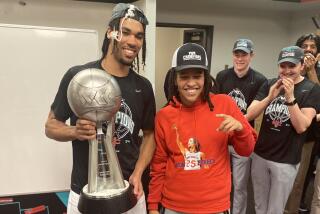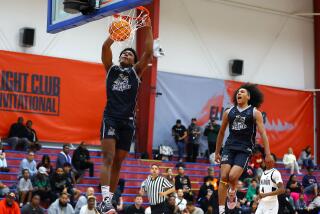Only Injuries Can Stop Pint-Sized Pookey, and They Have
- Share via
Nine days earlier he had undergone surgery on his right knee for the third time. And there wasn’t much cartilage left in the knee, anyway.
So it was no surprise that Pookey Wigington out of Morningside High didn’t make the trip from New Jersey two weeks ago.
Wigington’s Seton Hall University basketball team was in town to play Providence College in Rhode Island, and the Hall prevailed, 80-68, in a Big East Conference skirmish. The Pirates could have used Wigington off the bench but weren’t hurt without him.
“I look at it this way,” Wigington says. “When I get back, every game is gonna be my game.”
Tall players would glance at his 5-3 frame and snicker. But he’d show them. “I was really quick. I could go by anyone,” he recalls.
And he still can. Until the pain gets in his way.
It hit a few months after Wigington graduated from Morningside High School in 1984. He tore cartilage while playing for Midland, Texas, junior college, and some of the damaged tissue had to be removed.
He sat out a year, hoping his problems would go away. And for a while, they did.
Wigington moved on to Ventura College in 1986 and averaged 11 points, 8.3 assists and 5.4 steals. His knee started acting up toward the end of the season but not enough to stop him from claiming Most Valuable Player honors in California’s JC postseason tournament. Seton Hall grabbed him and said he would start. So he wasn’t worried.
Before he left for New Jersey, he played in a summer league at Morningside without much pain. But someone stepped on his foot, prompting him to wrench his knee again; he figured it was a minor twist.
By September, however, he was back in surgery, this time to remove most of the cartilage on the damaged side of the joint.
“They told me it was so crushed and torn that they had to remove it. All I could do was try to understand, but I was really hurt,” Wigington recalls. “I knew I would never play up to my capabilities again.”
Doctors opened Wigington’s knee a third time in February to remove torn cartilage from the other side of the joint. Some grinding of bones has resulted with so little cartilage left. “Early arthritic changes” now are occurring in Wigington’s knee, according to his doctor, Gary Gallick. And that means more pain.
Ask Wigington if his statistics at Seton Hall (1.7 points, 1.9 assists and 8.7 minutes a game this season) are low mostly because of his injury, and he says: “Not mostly. Only.”
Wigington acknowledges that it wouldn’t be fair for him to start since he has practiced only about 20 times. His role now is to spell point guard Gerald Greene. “We definitely miss him,” says shooting guard John Morton.
But not as much as Wigington misses the game.
“When I first came to Seton Hall, I felt it was gonna be my program and my show,” Wigington says. “I looked forward to playing all the guards in the conference. I felt like I was better or just as good. I just wanted to prove it. Without the injury, I think I would have been a totally different player. But I guess it wasn’t meant to be.”
Seton Hall made its first-ever trip to the NCAA tournament in Wigington’s first season when he averaged 1.7 points and 1.7 assists in 31 games and committed only one turnover in 21 minutes as the Pirates upended Georgetown in the Big East tournament. He also was named MVP of this season’s Great Alaska Shootout.
And Seton Hall received another NCAA bid, partly because of Pookey. The Pirates play Indiana Thursday in a third round game at Denver, and Pookey is hoping for playing time. He played in each of Seton Hall’s first two wins. “In two years, he’s been taken advantage of twice,” says Seton Hall Coach P. J. Carlesimo. “By Charles Smith (of Georgetown) and Sherman Douglas (of Syracuse). His size creates more problems for others than for us. He is a big-time player, no question, and there is no way of telling how effective he could be without the injury. People just don’t understand how his knee has limited him.”
Others probably wonder how Wigington, shortest player in the Big East, overcomes his lack of height.
At first, Ventura Coach Phil Matthews didn’t think Wigington could play even junior college ball, and who could blame him? Wigington had not played in a year.
“When I met him, his height was an issue,” says Matthews. “I told him he couldn’t play for me, and he said he could. We went round and round, and he won.”
Wigington made Matthews a believer two days into practice. Now they chat at least once a week. And how does Matthews feel about budding Pookeys? “I don’t care how big they are,” he says. “If they can play, they can play.”
There have been other converts, too.
Wigington went to elementary school in South Central Los Angeles and most of his friends were Crip gang members. When he moved to a Blood neighborhood in Inglewood, he had trouble. “You tended to use Crip slang back then,” he remembers, “and when I moved to Inglewood, some guys didn’t like me and some guys wanted to jump me.”
Basketball arbitrated the dispute.
“My school didn’t have a team, but when I went to play in PE, no one could stop me. The teacher formed a team because of me and they started to like me after that. They started to put me on a pedestal,” Wigington says.
Wigington was determined to prove he could play, so he went to many neighborhoods for a challenge.
He laughs thinking about those times. “I went out expecting guys to try to take advantage of me, and I wanted to show them they couldn’t. It was like I had a chip on my shoulder.”
Back in elementary school, Wigington’s team scored about 39 points a game. He averaged 33.
“No one else was allowed to shoot the ball,” he recalls. “My coach used to say, ‘Get the ball to Leland.’ I was the man.”
Leland. His real name. His father nicknamed him Pookey after a relative. It stuck.
It’s as big now as that of any of his high school peers. Wigington and Oval Miller, who played at Cal State Fullerton, led Morningside to a 25-4 record and a berth in the CIF 4-A semifinals in 1984.
In high school and earlier Wigington also played against former St. Bernard standouts Corey Gaines, Eric Knox and Brian Williams. Gaines, who progressed to Loyola Marymount, is now with the New Jersey Nets. Wigington also joined Elden Campbell, another Morningside teammate now at Clemson, last summer as a member of the Nike/NIT All-Star team that compiled a 7-1 record in Soviet Union and Scandinavia. “They loved him there,” says Ron Randle, Wigington’s coach at Morningside.
Now, it’s as if the game has been taken from Wigington, along with the inside of his knee.
He knows there are alternatives. “I realize that school has to be my key,” says Wigington, a third-year accounting major. But he says he feels somewhat cheated by his knee problem. See, Wigington believes he once had a shot to become another Spud Webb or Muggsy Bogues, the tiny havoc-wreakers of the NBA. “I never really wished I was taller,” he says.
Just healthier.
More to Read
Go beyond the scoreboard
Get the latest on L.A.'s teams in the daily Sports Report newsletter.
You may occasionally receive promotional content from the Los Angeles Times.










